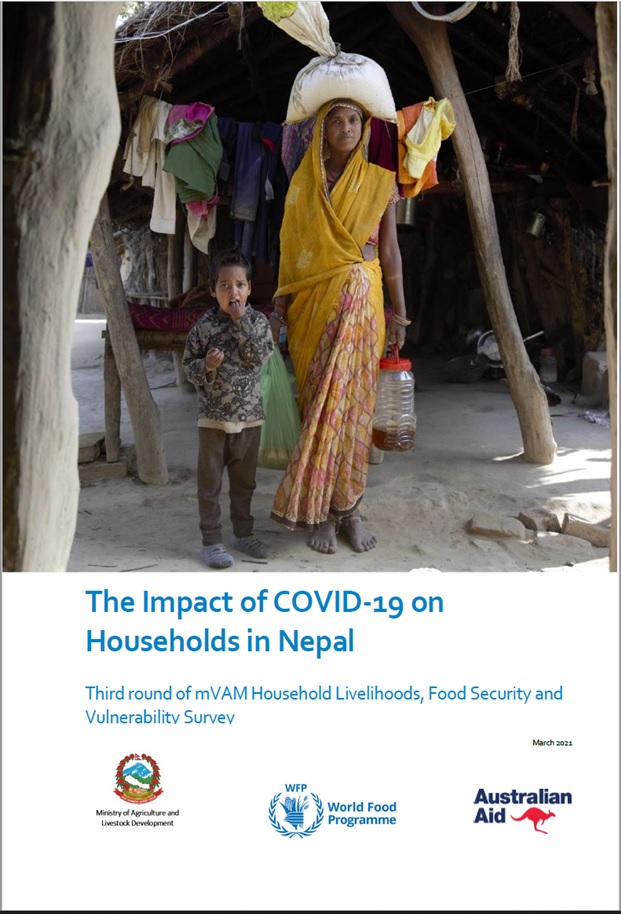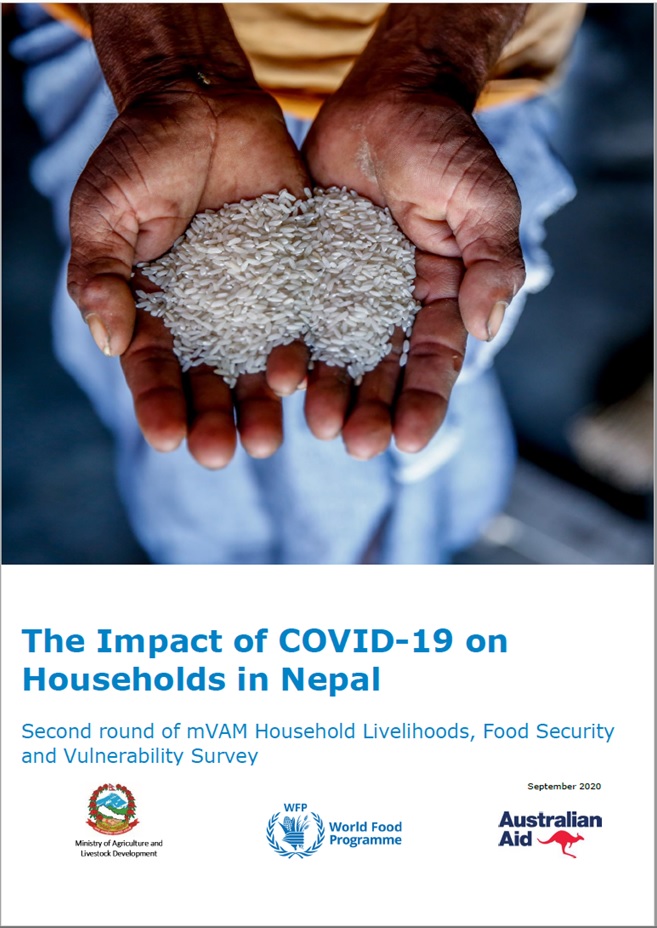Home > NEWS & EVENTS >
NEWS & EVENTS
-
Brief on the Food Security Situation in Nepal (Mid-July to mid-November 2017)2018-03-15
-
Launch of Food Security Information System for Nepal2017-11-10
-
Second Advance Estimate of 2016/17 Wheat Production in Nepal using CRAFT2017-05-15
-
Brief on the food security situation in Nepal (Mid November 2016 to Mid March 2017)2017-05-12
-
Updated NeKSAP guidance on food security response analysis and district food security monitoring2017-04-24
-
First advance estimate 2016/17 wheat production in Nepal using CRAFT2017-04-05
We are pleased to share the report, First Advance Estimate of 2016/17 Wheat Production in Nepal using the CCAFS Regional Agricultural Forecasting Toolbox (CRAFT).
This is a preliminary estimate and it will be revised with updated crop planted area and climate data as the season progresses.
This is a joint product of the Ministry of Agricultural Development (MoAD), World Food Programme (WFP), and the CGIAR Research Program on Climate Change, Agriculture and Food Security (CCAFS). The CCAFS Regional Agriculture Forecasting Toolbox (CRAFT) is being piloted as part of the Nepal Food Security Monitoring System (NeKSAP) and is a new initiative to incorporate crop yield forecasting in Nepal with technical support from CCAFS South Asia.
-
Second Advance Estimate of 2016 Paddy Production in Nepal using CRAFT2016-11-11
-
NeKSAP Handover_Press Release2016-06-13
-
Second Advance Estimate of 2015/16 Wheat Production in Nepal using CRAFT2016-04-25
We are pleased to share the report, Second Advance Estimate of 2015/16 Wheat Production in Nepal using the CCAFS Regional Agricultural Forecasting Toolbox (CRAFT).
This is a preliminary estimate and it will be revised with updated data as the season progresses.
This is a joint product of the Ministry of Agricultural Development (MoAD), World Food Programme (WFP), and the CGIAR Research Program on Climate Change, Agriculture and Food Security (CCAFS). The CCAFS Regional Agriculture Forecasting Toolbox (CRAFT) is being piloted as part of the Nepal Food Security Monitoring System (NeKSAP) and is a new initiative to incorporate crop yield forecasting in Nepal with technical support from CCAFS South Asia. Click here to download the full report. -
First Advance Estimate of 2015/16 Wheat Production in Nepal using the CCAFS Regional Agricultural Forecasting Toolbox (CRAFT)2016-03-21
-
Crop Situation Bulletin for Winter 2013 released2014-09-01
With 615,400 mt of production, the central region has the largest share of wheat production (33 percent). Rupandehi, Dhanusa, Bara, Kapilvastu and Parsa are the top 5 wheat producing districts in 2013/14.
-
NeKSAP Website Inaugurated by Joint Secretary, ABPSD2014-03-23
NeKSAP Website was formally inaugurated by Joint Secretary, Mr. Vijoy Mallick, ABPSD Division at MoAD on March 23rd, 2014.
-
Food Security Response Analysis Piloting Training at Makwanpur2014-03-22
Food Security Response Analysis Piloting Training was conducted from March 12 to March 15 at Makwanpur
-
Food Security Response Analysis Training at Bara planned from Mar25 to Mar28, 20142014-03-22
Food Security Response Analysis Piloting Training at Bara is planned on March 25 - March 28, 2014.
-
Press Release - Number of VDCs facing food insecurity falls to 6 from 1452014-03-18
Number of VDCs facing food insecurity falls to 6 from 145
KATHMANDU, FEB 21 -
The number of food-insecure village development committees (VDCs) in the country has dropped significantly to six as of November 2013 from 145 during the period April-June 2013, reported Nepal Food Security Bulletin which is jointly published by the Ministry of Agricultural Development and the World Food Programme.
-
Food Security Response Analysis TOT2014-03-07
Food Security Response Analysis Training of Trainer was conducted in Hetauda, Makawanpur. The overall objective of the FSRA TOT is to develop trainers with the technical knowledge and skills on facilitating the Food Security Response Analysis Training.
-
Summer Crop Assessment Mission2013-12-16
Summer Crop Assessment mission was started from December 4th, 2013. The mission was carried out in 16 districts of 5 Development Regions.
-
NeKSAP Debriefing Meeting (April - June 2013)2013-07-31
The main objective of the Debriefing meeting is to compile all the information related to food security from the DFSN meetings and consultations and present the overall situation of the districts/clusters. Debriefing Meeting was held separately in all the 5 Development Regions for the first time.
-
Regional Consultation Meetings2013-05-24
Regional Consultation Meetings were carried out in all the 5 Development Regions. The main objective of the meeting was to disseminate the NeKSAP project activities; project implementation processes to the key stakeholders at the regions and the districts; so that the stakeholders will be aware on, and be ready to contribute/participate in during the project implementation phase.
-
NeKSAP Food Security Phase Classification Review Workshop2013-03-22
NeKSAP Review Workshop was carried out in March 22nd, 2013 at Dhokaima Café, Lalitpur. Overall objective of this workshop was to review the NeKSAP Food Security Phase Classification in the spirit of strengthening and institutionalizing of the NeKSAP into the Government structure, which includes major focus on Indicator, Methodology, Reporting and Institutional linkage.
-
National Inception Workshop2013-03-20
One day Inception Workshop was carried out in March 20th, 2013 at Hotel Summit. The main objective of the workshop was to disseminate the NeKSAP project activities; project implementation processes to the key stakeholders; so that the stakeholders will be aware on, and be ready to contribute/participate in during the project implementation phase.
News & Events
- Brief on the Food Security Situation in Nepal (Mid-July to mid-November 2017)
- Launch of Food Security Information System for Nepal
- Second Advance Estimate of 2016/17 Wheat Production in Nepal using CRAFT
- Brief on the food security situation in Nepal (Mid November 2016 to Mid March 2017)
- Updated NeKSAP guidance on food security response analysis and district food security monitoring

